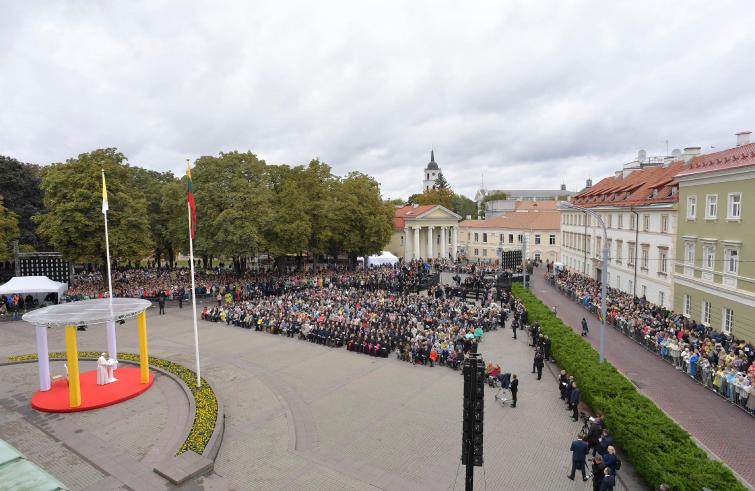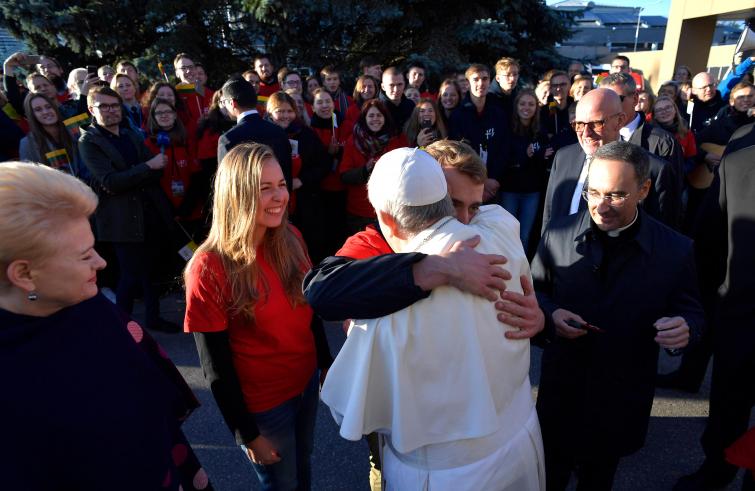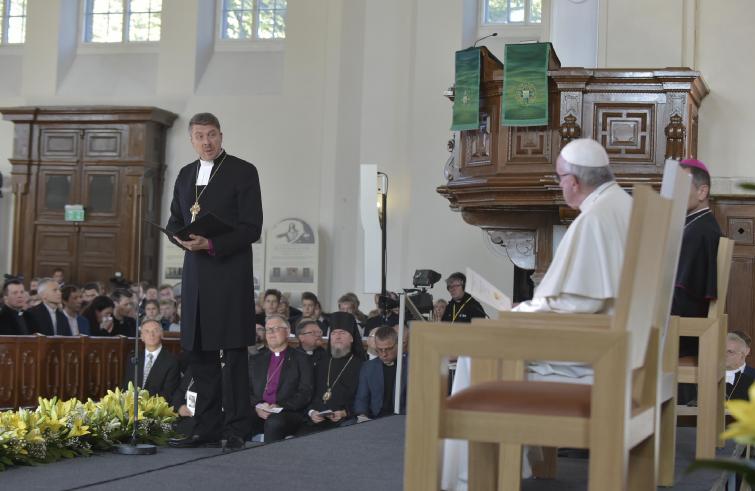A WEEK LATER
The press officers of the Bishops’ Conferences of Lithuania, Latvia, Estonia, retraced the path of Pope Francis’ journey. Each from their own Country, they all declared: “We are only at the beginning of a reflection process. The conclusions will be drawn further ahead. People are now asking for the texts of the Pope’s speeches to reread them and reflect further.”

A climate of wonder, enthusiasm, satisfaction and some tiredness in Vilnius, Riga and Tallin after the Pope’s visit. Those who worked in the organizing process at local level are taking a period of rest after the tour de force that major events typically entail. It’s not easy to meet those we wish to interview for an overview of the visit, to collect first-hand impressions of those days of September 22-25, when Pope Francis visited Northern Europe. Three female voices, three women in charge of relations with the press for the Bishops’ Conferences of Lithuania, Lativa, Estonia, agreed to be disturbed, despite their well-deserved vacation period, and shared their experience.

From Lithuania. “The Holy Father’s visit to Lithuania was the celebration of hope, of faith”, said Zivile Peluritiene from Vilnius. The  numbers are the simplest way to assess the success of the Papal visit: “About 200 thousand people attended events with the Holy Father in Lithuania, over 5 thousand accredited people. Ratings released by LRT, the national television channel, show that over 1 million people watched the visit on TV”. Another positive aspect is the cooperation between the Church and government institutions for the visit’s preparation: “It was exemplary; everyone felt involved in a common project for Lithuania. The Church was seen as an important partner for the government.” Those two days can be rightfully considered “the crowning moments in the celebrations for the centenary.” Although it’s still early for a final assessment:
numbers are the simplest way to assess the success of the Papal visit: “About 200 thousand people attended events with the Holy Father in Lithuania, over 5 thousand accredited people. Ratings released by LRT, the national television channel, show that over 1 million people watched the visit on TV”. Another positive aspect is the cooperation between the Church and government institutions for the visit’s preparation: “It was exemplary; everyone felt involved in a common project for Lithuania. The Church was seen as an important partner for the government.” Those two days can be rightfully considered “the crowning moments in the celebrations for the centenary.” Although it’s still early for a final assessment:
“Much more significant results are expected in the future: how many people have listened to the words of the Holy Father with an open heart, how will young people respond to their vocation …”.
The work done with the press was equally positive: “The media collaborated extensively with the organizers to highlight not only the visit, but also the figure of the Holy Father, with news reports about the Church and her governance, her teachings and symbols, dedicating special attention to pilgrimage sites in Lithuania.” Those who followed the media in Lithuania as well as in neighbouring Countries, said “the comments were positive, with a warm invitation to meet the Holy Father.”

The meeting with young people in the square bordering on Vilnius’ Cathedral was a highlight of the visit: “It was experienced as a small-scale celebration of the World Youth Day: in the way in which it began, with a festive moment, in the multi-language recital of the Chaplet of Divine Mercy before the original image, sign of Church unity, followed by high point of the day: the arrival of the Holy Father and his heartening speech.” Zivile highlighted another aspect that garnered less media interest: being near the Nunciature in the evenings of Pope Francis’ visit, “was a blessing for the Lithuanian people”, and every evening “hundreds of people from various Catholic organizations and movements sang songs and hymns for the Pope.” A post from Facebook well describes people’s emotions: “We are fortunate to live in the same city where Pope Francis is sojourning.” The last morning even people living in distant cities gathered in areas near the Nunciature to greet the Pope. The organizers were helped by over 1000 volunteer workers: “In their remarks after the visit they told us they had received much more than what they had given.” Zivile said that one of the most powerful recollections of the visit was when on the first day Pope Francis unexpectedly stopped along the way from the Aurora Doors to the square facing the Cathedral, near Michal Sopocko Hospice, to bless terminally ill patients who were “living their last days in silence, where time has stopped.” Another moving moment was when, during the meeting with young people “they spontaneously started singing a Blessing for the Holy Father.” She explained: “Many youth groups use this song to pray for a dear person and extend thanks to the Lord for him/her.” Indeed,
“there still a lot to reflect upon, as we reread and recall the speeches delivered by the Holy Father.”

From Latvia. “The whole of society will reflect on the Pope’s visit for some time. I think that we’re just at the beginning of a reflection

process. The conclusions will be drawn in due time. Now people are asking for the texts of the Pope’s speeches to reread them and to deepen their reflection”, said Ingrida Puce from Riga, highlighting a more than positive picture. Equally positive “is the feedback from social brackets that are distant from the Church, voicing appreciation over the Pope’s words and especially over his critical remarks.” The event in Anglona, where the Pope celebrated Holy Mass in the afternoon of September 24, “was difficult for the pilgrims owing to the cold weather and the rainfalls. In addition, the popemobile took a different route because of heavy rainfalls, so many people were disappointed because they could not see him up close. But weather cannot be mastered!” Ingrida underlined Francis’ tiredness: “The Pope seemed very tired that day and we tried to understand, to explain the reasons for his tiredness or sadness, I don’t know. One thing I eventually learned is that
The visit at the Freedom monument must have been a painful experience for him, charged with heavy thoughts.”

Commentators on Latvian newspapers highlighted the Pope’s speeches to national authorities: they were impressed by the fact that “the Pope said that material life is not the most important thing, and that for the good of the Country it’s important to work for the good of everyone. They also gave prominence to his appeal to embrace those who suffer, those found in the peripheries, not only in geographic terms.”
“Emphasis was also given to the Pope’s invitation to the Country to act as a bridge between the East and the West.”

From Estonia. “Everything went very well” also in Estonia, said Marge-Maria Paas. “I hope that Estonia has managed to convey its most beautiful, heartfelt emotions to the Pope.” She said it was “a major historic event”, reconfirmed by comments on the press: “Beautiful, sincere and heartwarming.” She expanded on her astonishment:
“An event of the Catholic Church was broadcast live for the first time in the history of Estonia. This great media interest and coverage is incredible for Estonia. Even in Russian-language media! Now we need to rethink our ways of being present.”
The Estonian people are “reserved but kind, and the atmosphere was fraternal and authentic. Everyone is surprised” about what has happened. The ecumenical meeting with young people was “inspiring”. “In his address in the Lutheran church Pope Francis gave young people confidence and hope”, notably, his encouragement “to engage in cross-generational dialogue, to be a transparent community, and when he said that love that is not dead, that love is alive.” Significant words were spoken by bishop Philippe Jourdan to the Pope on that occasion: “Wherever you are, Holy Father, we are all there with you. We are united to you.”

Huge numbers for a very small Catholic community (1.500 young people present in the Lutheran church and almost 10 thousand people in Liberty Square in Tallinn), considering the size of the Catholic community of Estonia, comprising less than 7 thousand faithful.
On September 27 all those who helped organize the Pope’s visit came together for a celebrative event, said Marge-Maria. During Mass bishop Jourdan underlined the importance of the visit and reiterated three indications drawn from the Papal visit: now it is necessary “to appreciate the beauty of freedom; to return to seek spiritual values and understand what holiness means today.”